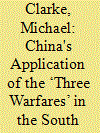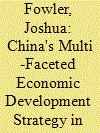| Srl | Item |
| 1 |
ID:
170149


|
|
|
|
|
| Summary/Abstract |
This article explores the development and application of the People’s Republic of China’s
information warfare (IW) strategy to two distinct security challenges: the South China Sea and the
threat of Uyghur terrorism in Xinjiang. The application of China’s IW strategy in the South China
Sea dispute demonstrates that, in contrast to Western understandings whereby IW is seen as an adjunct
to more kinetic strategies of conflict, China’s conception of IW is not just relevant in times of conflict
or crisis, but applicable across the peacetime-crisis-war spectrum. The application of aspects of the
“three warfares” in Xinjiang meanwhile demonstrates China’s blurring of the lines between “national
security” and “regime security.”
|
|
|
|
|
|
|
|
|
|
|
|
|
|
|
|
| 2 |
ID:
170148


|
|
|
|
|
| Summary/Abstract |
Sino-East African infrastructure investment and international trade have reached record levels and garnered global interest in recent years. Despite this attention, there is a lack of project-level analysis and documentation relating to China's overarching economic strategies in the East African region. By analyzing the Addis Ababa-Djibouti Railway and the Damerjog Port-Ogaden Basin gas pipeline projects, this article discusses project-level details and their roles in China's overarching economic development strategy. Through analysis on bilateral trade and infrastructure development connectivity, this article determines the derivatives and long-term strategic interests of Sino-African trade and infrastructure investment.
|
|
|
|
|
|
|
|
|
|
|
|
|
|
|
|
| 3 |
ID:
170153


|
|
|
| 4 |
ID:
170147


|
|
|
| 5 |
ID:
170152


|
|
|
|
|
| Summary/Abstract |
Grand strategy provides the strategic vision for a state in pursuit of its national interests. The current U.S. grand strategy straddles the line between isolationism and off-shore balancing. Based on the international relations theory of realism, these strategies view international actions as a zero-sum game. In other words, a country can only benefit at the expense of another. The zero-sum logic is clearly articulated in the “America First” strategic documents. It is also apparent in many of the president's speeches and policy actions. While the Trump administration's zero-sum approach has potential to rebalance burdens and level the playing field in such areas of trade, it is fraught with risks and jeopardizes the standing of the United States in the world.
|
|
|
|
|
|
|
|
|
|
|
|
|
|
|
|
| 6 |
ID:
170151


|
|
|
|
|
| Summary/Abstract |
Modern Russia is a revisionist, if not a revanchist, nation-state. It seeks to end the efficacy of the post-World War II institutionalized rules-based international order, which was created and maintained by the U.S.-led Western alliance. Russia pursues this objective to reclaim great power status and dominate the region and its borders. However, it lacks the strength to achieve this goal directly. To be successful, Russia must devise a strategy for bringing about cumulative changes in the relative power of the United States and Russia. And, it must do so while avoiding direct confrontation. A model for such an indirect approach exists.
|
|
|
|
|
|
|
|
|
|
|
|
|
|
|
|
| 7 |
ID:
170154


|
|
|
|
|
| Summary/Abstract |
This year marks the 40th anniversary of President Jimmy Carter’s decision to normalize
relations with the Peoples’ Republic of China. Many scholars at the time were perplexed at the seeming
haste of the decision. The Foreign Policy Research Institute’s former president, William R. Kintner,
wrote of the problems of “strategic innocence,” as well as the potential unintended consequences of
“Carter’s China Gamble.” His article, originally published in Fall 1979, reminds readers how
perilous international relations were at the time and how high the stakes for were for future U.S.-
Soviet relations, as well as the precarious position of Taiwan. Time has validated the prescience of his
observations.
|
|
|
|
|
|
|
|
|
|
|
|
|
|
|
|
| 8 |
ID:
170150


|
|
|
|
|
| Summary/Abstract |
Since the late 1990s, Taiwan has leveraged humanitarianism—both the world’s and its
own citizens’ humanitarian impulse—in a variety of ways. Presenting itself at times as a victim of
disasters and at times as a rescuer and aid provider, Taiwan seeks to assert its presence and role in
the global arena through the expansion of its humanitarian space. This article looks at the ways in
which Taiwan has pursued these goals. Over the same period, Taiwan’s humanitarianism has evolved.
While government support for, and involvement in, humanitarian action was long rhetorical, Taiwan’s
improved Humanitarian Assistance/Disaster Relief (HA/DR) capabilities and civilian-military
coordination have implications for both regional security and U.S. policy towards Taiwan.
|
|
|
|
|
|
|
|
|
|
|
|
|
|
|
|